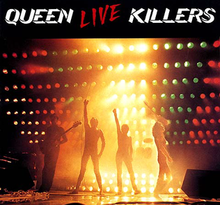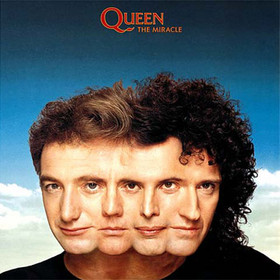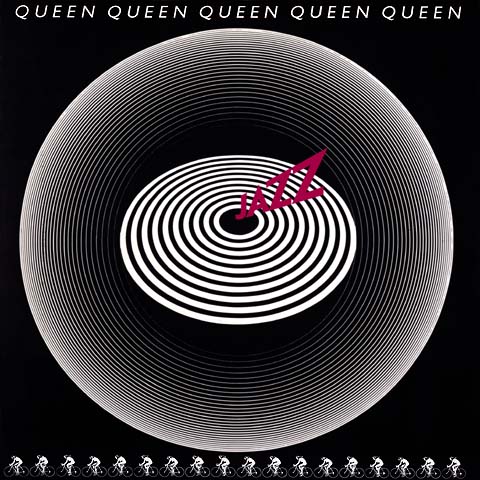05-08-1975 – Sheer Heart Attack – Rolling Stone (Issue 186)
by Bud Scoppa
Two of the most liberated and ambitious of the “fun” oriented British bands beginning to make their mark in the States are the updated war-horses Pretty Things and the nouveau-heavies Queen. Both of these groups, which could easily—if not accurately—be termed “psychedelic,” seem to be signaling the advent of what may well be a renaissance of affective rock & roll. If the renaissance occurs, it will be as a result of autonomous imaginations like these; imaginations free enough to permit the introduction of such seemingly outlandish and inept devices as marching bands and carnival noises (can you imagine the Allman Brothers even considering this?) and somehow to put them to good use. Of course, no device would work if these two bands weren’t firmly grounded in the fundamentals of rock & roll—and the Pretty Things and Queen have certain manifestations of these in common: Each band likes to lay high, firm three- or four-part harmonies and an anything-goes range of effects over a hard, visceral base of guitar, bass and drums.
In the recordings of each group, there exists the clear evidence of intelligent minds at work; there’s even a suggestion of taste here and there, but happily without the restraint that usually accompanies it.
Queen—on the record and on the jacket, too—makes no concessions to moderation. This quartet, bejeweled and mascaraed, projects a correspondingly shrill surliness in its dramatically technologized rock & roll. And Queen makes unusually crisp, dense recordings — the group’s three albums vibrate with multilayered electric guitars and unearthly overdubbed vocal harmonies (which have the unfortunate tendency to sound at times like Uriah Heep’s). But there’s more to Queen than rouge and chrome. The group’s main writers, singer Freddie Mercury and guitarist Brian May, work in a sophisticated, glib style and the material’s wittiness lifts the ponderously thick music like flaps on a jumbo jet. On Sheer Heart Attack, “Killer Queen” (which would seem from the title to be a sonic blitzkrieg) and “Bring Back That Leroy Brown” are surprisingly light showcases for Queen’s wit and vocal dexterity, calculated — like everything this band has ever done—to turn heads in surprise and wonder:
She keeps Moët et Chandon
In her pretty cabinet
“Let them eat cake,” she says
Just like Marie Antoinette
A built-in remedy
For Khrushchev and Kennedy …*
Queen knows its stuff but they haven’t yet managed to approach the stunning flamboyance they displayed on “Liar” and “Keep Yourself Alive,” the best tracks on the first album, Queen, much less show any noticeable development since their promising beginning. And like 10 c.c., which the band sometimes resembles, Queen tends to confuse coyness with profundity and to go for resolution to the lyrical non sequitur. If there’s no meaning (there isn’t), if nothing follows (it doesn’t), if you can’t dance to it (it would seem that you can’t), Sheer Heart Attack is still, like its two predecessors, a handsomely glossy construction. If it’s hard to love, it’s hard not to admire: This band is skilled, after all, and it dares.
- ©1974, Feldman/Trident Music.
The Pretty Things are from a different part of town. Once competitors with the Stones in the raunch-and-outrage genre, the Pretty Things began a progression of ongoing modifications when they didn’t meet with approval in the States. The group, led from the start by lead vocalist Phil May, never even attempted to play it safe, adding horn sections to their recordings before that technique had even been generally considered, much less accepted, and conceiving in 1967 what was surely the first “rock opera,” S.F. Sorrow. Today, most of the band’s work up to and including that concept album sounds dated, but its work in the Seventies (still not at all well known or recognized) is something to behold. The last three releases, Parachute (Rare Earth/Motown), Freeway Madness (Warner Bros.), and the new Silk Torpedo (Swan Song) are tightly packed, delightful albums that tend to improve dramatically with repetition. In its wide-ranging intelligence, general adventurousness and rock & roll intensity, this trio of albums resembles the work of Mott the Hoople at its peak and—full circle—the Stones of Sticky Fingers. Silk Torpedo, the first of these to have a shot at hit status, may be the best of the three.
May writes all the songs, usually in conjunction with longtime keyboardman John Povey or with guitarist Pete Tolson, a relative newcomer, and he loves to aim his crafty rocker’s sights on such classic psychological themes as ego suffering (“Maybe You Tried”), the leap to faith (“Bridge of God”), love as salvation (“Is It Only Love”), unresolved Oedipal conflicts (“Come Home Momma”), sex role confusion (“Singapore Silk Torpedo”), aggression and liberation (“Belfast Cowboys”) and the meaning of dreams (“Joey”). He treats these topics impressionistically, in a half-facetious, half-earnest way. May demonstrates rock lyric writing at its most advanced, both formally and substantively.
But if the lyrics are the chocolate center of Silk Torpedo, its surrounding shell is what initially draws and then holds the listener. The Pretty Things are a marvelous rock & roll band; they can sound—just as convincingly — apocalyptic or kissing close and they use their range deftly, underscoring and italicizing through contrasts.
The title track enters with an icily tinkling piano rolling speedily through empty space, joined gradually by the suggestion of guitar and bass, until it runs head-on into a resounding, Townshend-like guitar-chord progression. This surreal and heavy environment is blasted apart when May’s voice enters, half singing, half shouting the desperately funny lyrics. Even though the track has become big and bludgeoning, it continues to move with the airy quickness of the opening piano, which emerges intact from out of the tail end of the number, undamaged by the collision.
“Joey” is a set up by a brief, static instrumental opening, “Dream,” with which it’s paired and out of which it introduces itself in the form of an ear-catching syncopated progression formed by piano, bass and drums. The track is propelled by a firm but flexible kind of power the likes of which I don’t recall hearing since the easily comparable Zombies classic, “Time of the Season.” May, a wonderfully unrefined singer with a unique inflective flair, turns in his best performance yet, touching down on the basic melody now and then, but otherwise flying upward into the tense ebullience that makes up the track’s atmosphere. Meanwhile, electric guitars and a backing chorus keep everything awash with mood. “Joey” is the catchiest cut on the album, but it’s more than that—it’s a stunning, unforgettable pop piece that could eventually become a memorable single.
There are others. “Is It Only Love” — even with its marching-band bridge — is an extremely affecting love song, “Maybe You Tried” and “Come Home Momma” are oceanic in their storminess and each of the nine tracks (two are medleys) is attractive in a singular way.
I don’t know how May and his band have managed to escape the attention of the American rock audience for so long, but Silk Torpedo should change that. And Freeway Madness and Parachute (both now deleted) will surely be regarded as two-dollar bin finds once the word gets out on this superior band. The Pretty Things have refined risk taking into an accessible style, and they take their chances with as much confidence, ease and effectiveness as any band now working in British rock.




